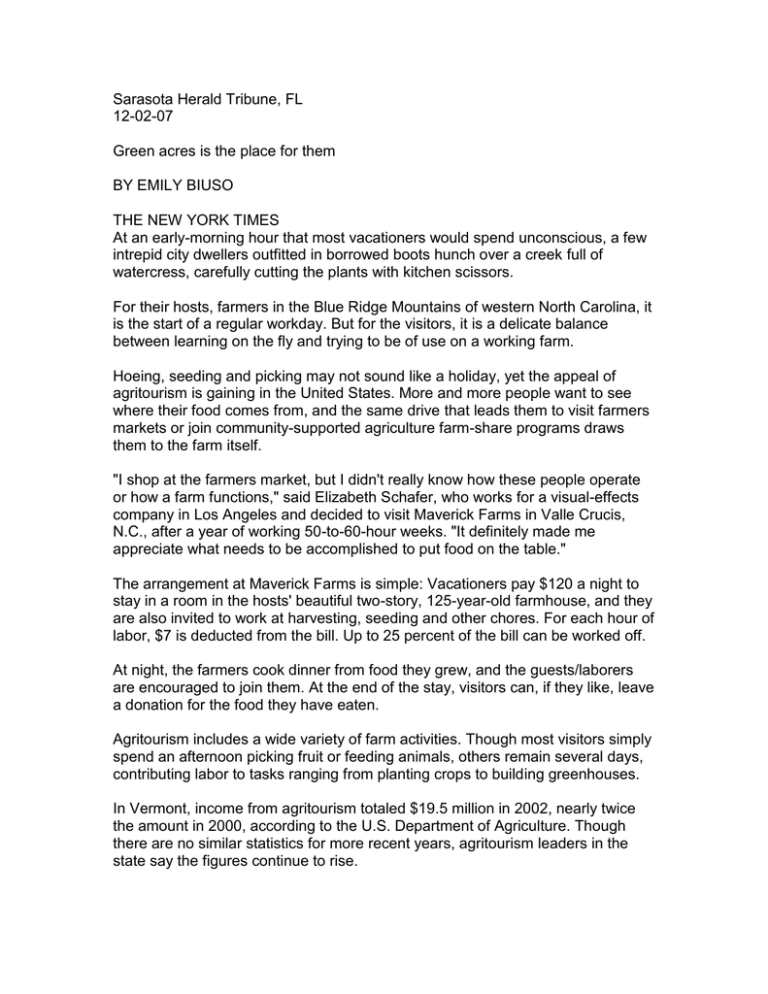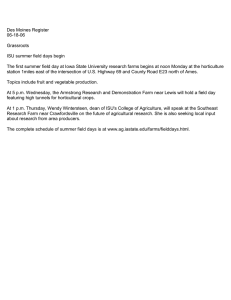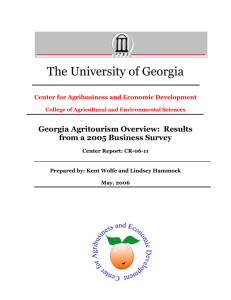Sarasota Herald Tribune, FL 12-02-07 Green acres is the place for them
advertisement

Sarasota Herald Tribune, FL 12-02-07 Green acres is the place for them BY EMILY BIUSO THE NEW YORK TIMES At an early-morning hour that most vacationers would spend unconscious, a few intrepid city dwellers outfitted in borrowed boots hunch over a creek full of watercress, carefully cutting the plants with kitchen scissors. For their hosts, farmers in the Blue Ridge Mountains of western North Carolina, it is the start of a regular workday. But for the visitors, it is a delicate balance between learning on the fly and trying to be of use on a working farm. Hoeing, seeding and picking may not sound like a holiday, yet the appeal of agritourism is gaining in the United States. More and more people want to see where their food comes from, and the same drive that leads them to visit farmers markets or join community-supported agriculture farm-share programs draws them to the farm itself. "I shop at the farmers market, but I didn't really know how these people operate or how a farm functions," said Elizabeth Schafer, who works for a visual-effects company in Los Angeles and decided to visit Maverick Farms in Valle Crucis, N.C., after a year of working 50-to-60-hour weeks. "It definitely made me appreciate what needs to be accomplished to put food on the table." The arrangement at Maverick Farms is simple: Vacationers pay $120 a night to stay in a room in the hosts' beautiful two-story, 125-year-old farmhouse, and they are also invited to work at harvesting, seeding and other chores. For each hour of labor, $7 is deducted from the bill. Up to 25 percent of the bill can be worked off. At night, the farmers cook dinner from food they grew, and the guests/laborers are encouraged to join them. At the end of the stay, visitors can, if they like, leave a donation for the food they have eaten. Agritourism includes a wide variety of farm activities. Though most visitors simply spend an afternoon picking fruit or feeding animals, others remain several days, contributing labor to tasks ranging from planting crops to building greenhouses. In Vermont, income from agritourism totaled $19.5 million in 2002, nearly twice the amount in 2000, according to the U.S. Department of Agriculture. Though there are no similar statistics for more recent years, agritourism leaders in the state say the figures continue to rise. In North Carolina, 46 percent of agritourism operators surveyed by the state Department of Agriculture reported an increase in income in 2004 from 2003. And in Tennessee, agritourism enterprises directly added about $17 million to the economy in 2006 and bring in more than 3 million visitors a year, according to the state agritourism coordinator. "It's grown because more farmers are finding out it's an important avenue to bring in revenue and stay on the farm," said Rich Pirog, associate director of the Leopold Center for Sustainable Agriculture at Iowa State University in Ames. "Secondarily, it's increasing because we've moved to an experience economy. People want to have a farm experience." Melissa Gunderson is a chef and caterer in Norcross, Ga. She, her husband, Eric, and their two young sons, Sam and Benjamin, visited Maverick in September. Since their stay, Gunderson has noticed a new appreciation of eggs by 3-yearold Sam. When she cracks one open for a recipe, he remembers seeing them up close in Maverick's chicken coop. "I'm so shocked he remembers that experience," she said. Maverick Farms is a working farm that was started by five novices in 2004, all friends in their 20s and 30s. Three had grown up on farms, but none had experience running one. They began it to help preserve family land from development, and important components of the farm's daily practices are reducing waste, saving energy and fostering local involvement whenever possible. Boarding tourists who want to learn about farming has always been part of the business model. "Agritourism is an incredible education tool," said Tom Philpott, a co-founder and co-director of Maverick who also writes about food and farming for the environmental Web site Grist.org. "This is a way to come and do a typical afternoon on a farm. Maybe somebody does this, and it sparks something." Philpott was first exposed to farming when he traveled around Italy and stayed at agriturismos. In Italy, such projects have been supported by the government since 1985, and farmers receive tax breaks to play host to visitors. It is a much more robust industry there and elsewhere in Europe, and many American farmers and educators have traveled abroad to see what methods can be imported from the Europeans. Beth Kennett, the owner of Liberty Hill Farm in Rochester, Vt., accompanied Sen. Patrick Leahy on a 1998 trade mission to Ireland and saw how agritourism was done there. "In Ireland, they consider this economic development," she said. "It put a whole other spin on it for me. I thought: 'This is real. This is a business model. We can emulate this in Vermont.' " In the mid-1990s, Kennett, other local farmers and the University of Vermont Extension Service formed the Vermont Farms! Association to organize agritourism in the state. After the trip with Leahy, the association received an agritourism grant from the Department of Agriculture, according to Kennett, who is now the association's chairwoman. Today, it offers training, support and marketing to farmers and provides guidance to associations in other states. Jill Adams of Adams Farm in Wilmington, Vt., and secretary of Vermont Farms! is a fifth-generation farmer on her family's land but not the first to welcome paying guests. In the 1880s, her ancestors put up families from New York who sought a retreat from city life. Her parents, William and Sharon Adams, closed off the farm to concentrate on dairy farming in the early 1970s, but in 1980 they decided to diversify and bought a team of Belgian draft horses to pull sleighs filled with visitors around the farm. The popularity of the rides and interest in the farm led the Adamses to take the government's offer to buy their whole herd of cattle as part of a federal program in 1986. The family was no longer in dairy farming, and they began to focus on agritourism and marketing their maple syrup and other products directly to consumers. In 1992, Jill Adams reopened the farm to the public. She now has more than 10,000 visitors a year. In addition to the sleigh rides, visitors can milk goats, gather eggs from the chicken coop, watch sheep-herding and see yarn being spun. Duncan Hilchey, an agriculture development specialist at Cornell University in Ithaca, N.Y., attributes the growth of agritourism to globalization and urbanization. "Farmers are realizing that food can be produced elsewhere cheaper," he said. "Adding education is a way to stay in business. As cities gobble up farmland, you're going to have to produce things that have more value." For many visitors, part of the draw is giving money directly to small farmers. "I think people are starting to realize what they lost," said Kennett of Liberty Hill Farm. "Here in our little valley of six towns, 11 farms were shipping milk 28 years ago. Now we're the last one." More than 1,000 overnight guests stayed at Kennett's farmhouse last year. If guests at Liberty Hill want to pick up a hoe they may, though most just want a way to interact with the animals a bit, perhaps by feeding a calf. "Part of it is nostalgia," she said. "But part of it is, 'Wait a minute; what's going on here?' People are starting to think about their food choices. Food politics has become a huge topic of conversation around my dinner table." This is also true at Maverick, where the dinner discussions ranged from globalization to community-supported agriculture programs to building infrastructure for local farms. "It's so much more than farming," said Alyssa Rudolph, the farm manager at Maverick. "It's a lot about the conversation." But being an agritourist is not all social responsibility and education. It is also about the pleasure of eating food you plucked from the vine, the satisfaction of getting your hands dirty and the joy of spending so much time outdoors. Jill Adams sees the transformation in city-weary travelers who visit Adams Farm. "One of the things we get is: 'Oh, my God, look at the stars.' "




